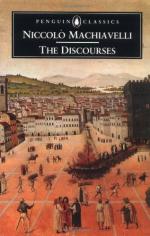
|
| Name: _________________________ | Period: ___________________ |
This quiz consists of 5 multiple choice and 5 short answer questions through Book Three, The Examples of Rome's Great Men, Sundry Remarks on Strategy, Tactics, New Devices and Discipline, Administrative Posts, Administrative Methods: The Rival Claims of Severity and Good Fellowship.
Multiple Choice Questions
1. What does Machiavelli claim new sects (religions) do as they rise to prominence?
(a) Destroy all the signs, including language, of the old sects they come to dominate.
(b) Influence Citizens to be obedient to the Prince.
(c) Cause Citizens to avoid fighting in wars.
(d) Influence the culture to defy the Prince.
2. What, according to Machiavelli in Book , 1 Section 38, is the fate of irresolute Republics?
(a) They will eventually fade away and reemerge as a tyranny.
(b) They cannot settle conflicts except with force because their weakness prevents them from resolving doubts over issues.
(c) They face invasion, destruction and anhilation.
(d) They have no alternative but to join alliances with powerful Republics that will take control of them.
3. What does Machiavelli believe comes to a good army without a good Captain?
(a) It breaks apart and goes home.
(b) It sells itself to the highest bidder.
(c) It regroups and promotes its most virtuous member.
(d) It becomes insolent and dangerous.
4. What are the three ways a Republic can expand that Machiavelli recognized?
(a) By conquering distant provinces, by supporting other provinces to conquer enemies, and to make allies with strong Republics.
(b) By making trade alliances with wealthy provinces, by joining in war with weak Republics, and by making alliances with powerful tyrannies.
(c) By joining in league with other Republics, make other Republics associates, and to make other Republics subjects immediately.
(d) By sending Nobles out to establish colonies, by sending armies out to conquer foreign provinces, and making other provinces associates.
5. Why does Machiavelli advise Captains to use new things at the time that he does?
(a) To give courage to his enemies and take it from enemies.
(b) Because the new technology requires different tactics.
(c) Because training is the best time to determine their use.
(d) Because the enemy won't see them in camp.
Short Answer Questions
1. What is an obvious counterpoint to Machiavelli's assertion to the benefits of the power of the Caesars to the Roman Empire?
2. Why does Machiavelli suggest that a Prince keep his conquered territories disunited from the City over which he has his power?
3. Why does Machiavelli suggest wars should be quick with limited damage to the conquered City?
4. What does Machiavelli suggest as the intention to make war?
5. What finally forced Phillip into battle with Fabius, according to Machiavelli?
|
This section contains 623 words (approx. 3 pages at 300 words per page) |

|




